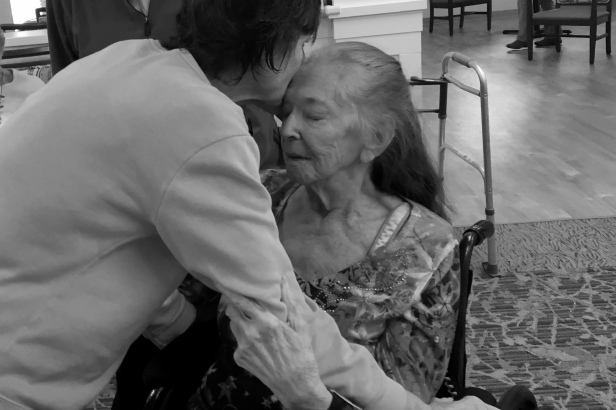Sometimes it’s not the person you miss, but the feelings and moments you had when you were with them (unknown)
It’s 2:30 in the morning and I am still awake. I can still hear one of the residents from earlier today saying, “Have you seen my mother?” “Where is she?” “Where is she?” She repeats her questions over and over again, becoming more distressed as time goes by and no one can give her a satisfactory answer. Another resident is frantically looking for “church,” and is inconsolable when he is repeatedly told the church is already open and everything is “okay.”
My first “go-to” book on Alzheimer’s Disease, Learning to Speak Alzheimer’s, by Joanne Koenig Coste, taught me that when someone with Alzheimer’s asks the same question over and over again, they aren’t really looking for the answer to that question. What they might be looking for is comfort and reassurance. Coste asks us to look for the meaning and feeling behind the question – if it’s not comfort, maybe what they’re looking for is something useful to do with their time.
In the hurried world of memory care, direct care staff have little time to reassure residents in need. Caregivers rush by, on their way to “toilet” someone, get another resident up, dressed, and to breakfast on time. On the next shift, staff must see that the designated list of residents receive their twice weekly shower, are “toileted” routinely and in the dining room for the next meal. In the meantime, residents are left in the busy wake of schedules and unplanned crises.
I witness this routine on a daily basis, not faulting the caregivers, as they most often work at the whim of for-profit corporations. In Oregon, the almighty “facility census” drives staffing ratios, not the individualized needs of residents at any given time. However, if by some miracle the Oregon legislature passes HB 3359, acuity-based staffing may become a reality, but probably not before my mother leaves this earth.
At times I am absolutely overwhelmed by the progression of my mother’s disease – my utter lack of control over what is happening to her before my eyes. Most days I strive to take control of what I can – how I actively chose to see my mother. I refuse to reduce her existence to behavioral “acting out,” characterizing her in this way if she fails to comply with a directive. Instead, I want to know what’s causing her anxiety and seek ways to alleviate her distress. Is she lonely, thirsty, hungry or in pain? She’s way past the ability to self-direct herself in any activity, so I do what I can to set up situations that may peak her interest, make her feel needed, or bring her pleasure. Every day is a puzzle to be analyzed, with some days working out better than others. No matter what happens, I’m in it for the long haul and grateful to have the love and support of Ellie, Judi, friends and our Conifer House family.

I am seeking,
I am not lost.
I am forgetful,
I am not gone.
Learning to Speak Alzheimer’s, page 127

Thank you for sharing your heart so clearly. Peace to you my friend, today and always! Love you.
LikeLike
Love you too – and thank you for your friendship and support!
LikeLike
Oh Diana,
What a moving musing youâve written again this weekâthe depths behind your words bring me to tears.
Know that while youâre lifting up your mother in her life, youâre helping all of us who read your insights, too.
Thinking of you and her and Ellie, too, today especially, and sending smiles and love,
Jane
LikeLike
Thank you, Jane! You kind words mean so much to me. I understand you and Ellie are surgery sisters tomorrow, so sending love and healing thoughts your way as well!
LikeLike
Diana – how I love you – and what you have done over the years for your mom. My thoughts and prayers are with you so often – and I truly wish we lived closer to one another. I miss Janet so much. Love, prayers and hugs coming your way – and to Ellie as well.
LikeLike
Thank you, Judi! Despite it all, I feel very lucky! I wish we lived closer, too!
LikeLike